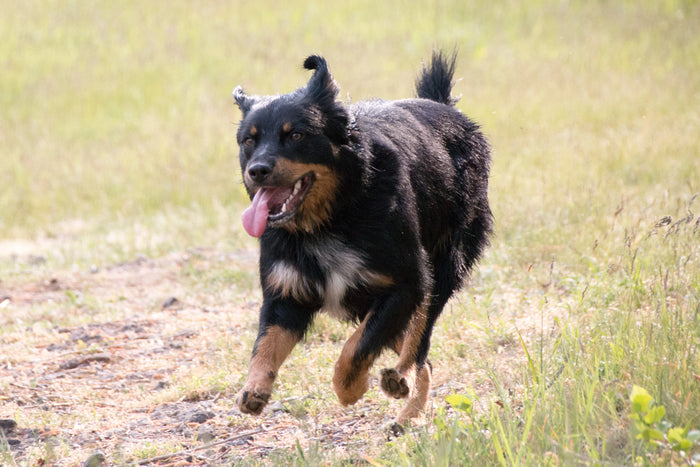Your cart is currently empty.
Most Common Digestive Issues in Dog
Our furry companions bring immense joy to our lives, but just like us, they can face digestive issues. As responsible pet owners, it's important to recognize common digestive problems in dogs to ensure their well-being. In this write-up, we'll explore some existing digestive issues our friends may encounter and how to address them with care.
1.Upset Tummies and Vomiting
Dogs are known for their curious appetites, sometimes leading to upset tummies. If your pup is vomiting occasionally, it might be due to dietary indiscretion. Sudden changes in diet or scavenging for forbidden treats can trigger this. Ensure a gradual transition when altering their food and keep tempting garbage out of reach.
- Diarrhea Dilemmas
Diarrhea is a common digestive woe among dogs and can result from various factors like infections, dietary changes, or allergies. Mild cases can be managed by fasting for 12-24 hours, followed by a bland diet like boiled rice and chicken. If it persists, consulting your vet is important to rule out underlying health issues.
- Constipation Concerns
On the flip side, constipation can trouble our furry friends. Inadequate fibre, dehydration, or lack of exercise are common culprits. Ensure your dog has access to fresh water, provide a balanced diet with fibre-rich ingredients, and encourage regular exercise to keep things moving smoothly.
- Pancreatitis Problems
Pancreatitis, inflammation of the pancreas, can cause severe digestive distress in dogs. It often results from a high-fat diet or ingesting fatty table scraps. Symptoms include abdominal pain, vomiting, and diarrhoea. Maintaining a low-fat diet and avoiding human food can help prevent pancreatitis. If suspected, consult your vet promptly.
- Gastric Torsion or Bloat
Gastric torsion, also known as bloat, is a serious and life-threatening condition, especially in larger breeds. It occurs when the stomach fills with gas, causing it to twist. This can obstruct blood flow and lead to tissue damage. Signs include a distended abdomen, restlessness, and unsuccessful attempts to vomit. Immediate veterinary attention is crucial. To reduce the risk, feed your dog smaller, frequent meals, and discourage strenuous exercise right after eating.
- Inflammatory Bowel Disease (IBD)
Similar to humans, dogs can suffer from inflammatory bowel disease, causing chronic inflammation of the digestive tract. Symptoms include diarrhoea, weight loss, and vomiting. Your vet may recommend a special diet and medications to manage the condition. Understanding your dog's dietary sensitivities and providing a tailored nutrition plan is essential in managing IBD.
- Intestinal Parasites
Parasites like worms can wreak havoc on a dog's digestive system. Common types include roundworms, tapeworms, and hookworms. Regular deworming and maintaining good hygiene practices can prevent these parasites. Watch for signs such as scooting, visible worms in the stool, or a distended belly. Your veterinarian can recommend appropriate deworming schedules based on your dog's lifestyle and potential exposure.
- Food Allergies
Food allergies can manifest as digestive issues in dogs, leading to symptoms like itching, ear inflammation, and digestive upset. Common allergens include beef, chicken, dairy, and grains. If you suspect food allergies, your vet may suggest an elimination diet to identify the culprit. Transitioning to a hypoallergenic or limited-ingredient diet can help manage allergies and improve your dog's digestive health.
- Colitis Concerns
Colitis, or inflammation of the colon, can lead to diarrhoea, straining during bowel movements, and blood in the stool. Stress, dietary changes, or infections can trigger colitis. A high-fiber diet, probiotics, and stress management can help alleviate symptoms. Consult your vet if you notice persistent colitis issues to rule out underlying causes.
- Megaesophagus Challenges
Megaesophagus is a condition where the oesophagus loses its ability to move food into the stomach properly. This can result in regurgitation, weight loss, and aspiration pneumonia. Feeding your dog in an elevated position or using a specially designed chair can aid in digestion. Your vet may recommend a consistent feeding routine and monitor your dog's weight to manage this condition effectively.
- Liver or Kidney Issues
Digestive health is closely tied to the functioning of vital organs like the liver and kidneys. Liver or kidney diseases can manifest in digestive symptoms such as vomiting, diarrhoea, or changes in appetite. Regular veterinary check-ups, a balanced diet, and monitoring for signs of organ dysfunction are crucial for maintaining overall health and addressing issues early on.
- Dental Problems Impacting Digestion
Neglected dental health can contribute to digestive issues in dogs. Dental problems such as gum disease or tooth decay may hinder proper chewing, affecting the digestion process. Regular dental check-ups, teeth cleaning, and providing dental chews can promote oral health and, in turn, support your dog's overall digestive well-being.
- Gallbladder Disorders
Issues with the gallbladder, such as gallstones or inflammation, can impact digestion. Symptoms may include vomiting, abdominal pain, and changes in stool colour. A vet can diagnose gallbladder problems through imaging and blood tests. Dietary adjustments, medications, or, in severe cases, surgical intervention may be recommended to manage these conditions and support digestive health.
- Stomach Ulcers
Stomach ulcers can occur in dogs, often due to prolonged use of certain medications or underlying health issues. Symptoms include vomiting, decreased appetite, and black, tarry stools. Treatment involves addressing the underlying cause, providing medications to reduce stomach acid, and making dietary modifications. Regular veterinary check-ups are crucial to monitor and manage stomach ulcers effectively.
- Sensitivity to Artificial Additives
Some dogs may have sensitivities to artificial additives or preservatives in their food. This can lead to digestive upset, including diarrhoea or vomiting. Choosing high-quality, natural dog food without unnecessary additives can help prevent these sensitivities. If you suspect your dog is reacting to certain ingredients, consider a trial with a simple, additive-free diet to identify and eliminate potential triggers.
- Eating Too Fast
Wolfing down food too quickly is a common behaviour in dogs, especially in multi-pet households. This can lead to issues like bloating or vomiting. Using puzzle feeders, slowing bowls, or dividing meals into smaller portions can encourage slower eating, aiding digestion. Addressing this behaviour not only supports digestive health but also reduces the risk of more serious conditions like gastric torsion.
- Irritable Bowel Syndrome (IBS) in Dogs
Similar to humans, dogs can suffer from irritable bowel syndrome (IBS), a chronic condition characterized by gastrointestinal distress. Symptoms include diarrhoea, abdominal discomfort, and changes in bowel habits. Maintaining a consistent and easily digestible diet, along with stress management, can help manage IBS in dogs. Your vet may recommend dietary adjustments, medications, or supplements to alleviate symptoms and enhance your dog's comfort.
- Cancer-Related Digestive Issues
Cancer can affect various parts of a dog's digestive system, leading to symptoms like weight loss, vomiting, or changes in appetite. Early detection through regular veterinary check-ups is crucial. Treatment options may include surgery, chemotherapy, or palliative care to maintain quality of life. Understanding the signs and seeking prompt medical attention can significantly impact the prognosis and comfort of a dog facing cancer-related digestive challenges.
Wrap up
Understanding and addressing common digestive issues in dogs is vital for their overall health and happiness. Always observe your furry friend's behaviour, monitor their diet, and seek professional advice if you notice persistent problems. By being attentive pet parents, we can ensure our dogs lead comfortable and joyful lives, free from unnecessary digestive woes.
Related Blogs
The Charm of Poodle Crossbreeds: Groodles, Spoodles, and More
Teacup Pomeranian Care Tips for Keeping Your Mini Pom Happy and Healthy
The Ultimate Guide to Rottweiler Mix Breeds
Free Delivery
From all AU orders
Support 24/7
Shop with an expert
Secure payment
100% Protected





Leave a comment